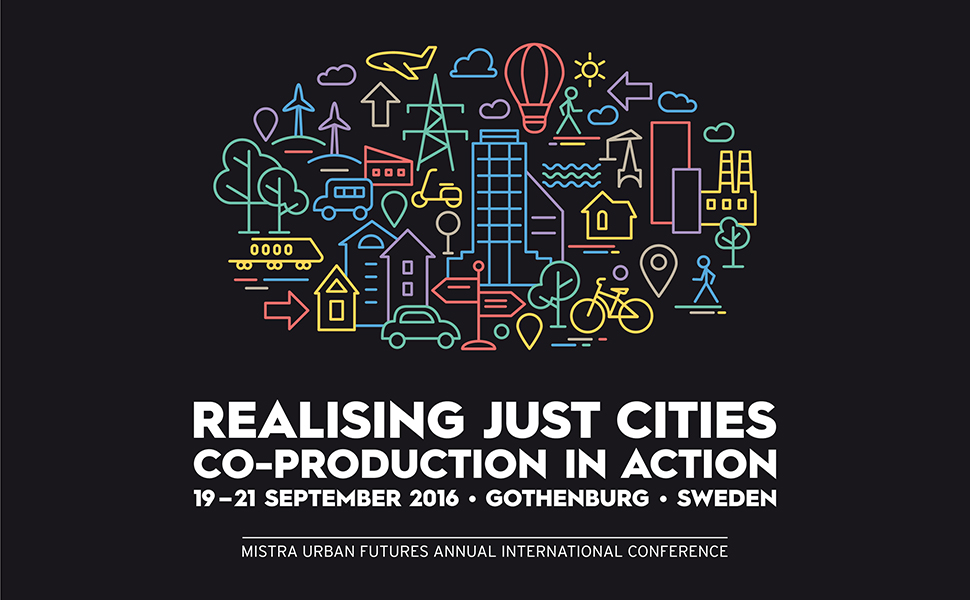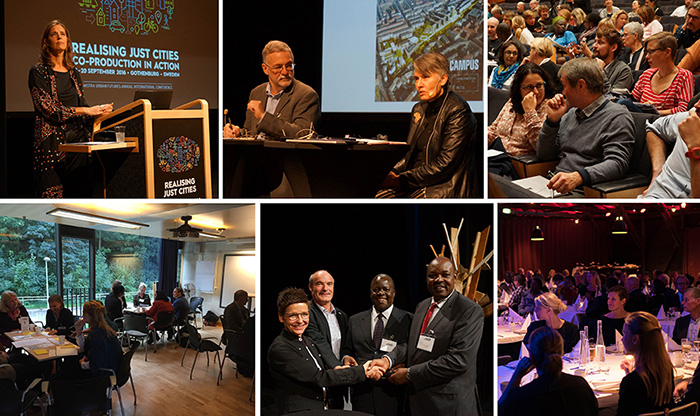
Realising Just Cities
Conference 19-20 September • Optional workshops 21 September 2016
The rapidly growing number of people moving into cities all over the world also present a challenge of unprecedented size. It is crucial to find ways to make urbanisation a source for wealth, health and sustainability – which is shared.
The integration of equity into the urban agenda is perhaps the most important contribution. Access to public space and social justice are pillars for opportunities and democracy for citizens, and the concept of equity adds the dimension of ‘needs’ and outcomes
Mistra Urban Futures arranged a conference about the 'Just City' and how it can be realised. The two-day conference, 19-20 September 2016, focused on lessons learned of co-production, the significance of sharing knowledge and developing supporting governance structures. The third day offered optional workshops for those wishing to take an active part in the shaping of projects and agendas for 'Realising Just Cities'.
Mistra Urban Futures works with co-production to create and gather knowledge about sustainable urban practice, for local implementation and global comparisons and collaboration. Sustainable urban development encompasses all areas of citizens’ lives: housing, health, work and family life. Social sustainability is promoted through democratic participation in society, creating places for community development and co-production of knowledge.
Documentation
The conference gathered 200 participants from eleven countries to discuss how we can realise just cities through co-production. Professor Henrietta Palmer guided the participants throughout the conference, which had over 20 speakers and facilitators from all of the Centres five platforms in Gothenburg, Kisumu, Sheffield-Manchester, Skåne and Cape Town.

Key notes
Dr Debra Roberts from eThekwini Municipality, Durban gave an inspiring talk about justice and equity and used the analogy that we have to manage and take care of the “urban motorcycle”. The concluding remark was that there is a need for a new social contract that breaks down barriers to power, knowledge and resources.
Professor John Robinson, University of Toronto, spoke about the Sustainability Imperative and the ten challenges it entails, for example housing, clean water, energy and land use. He also spoke about the need for co-production and that complexity is often underestimated when looking at transition paths. John Robinson also shared some limericks with the audience:
A Random Thought
Co-production’s the goal we all seek.
But what underlies the mystique?
Is it ethos or compound
And do we all sound
Rather abstract whenever we speak?
Prof John Robinson has kindy shared all his limericks - enjoy the reading.
Both keynote speeches were live streamed.
Sessions on just cities and co-production
Three sessions were held on Contextualising Just Cities, Why Co-production Matters and Learning from Co-production. Areas as that justice is nothing that will be organised by itself, the added value of co-production and its advantages in implementation and the role of intelligence in relation to ambition was discussed.
The audience also watched the animation of a poem, Just Urban Research written by Professor Beth Perry, Director, Mistra Urban Futures, Sheffield-Manchester.
A breakout session led by workshop leaders trained by Alda Sigurdardottir, Vendum allowed all participants to discuss Obstacles to realising just cities.
Book launches
At the conference dinner two books were launched, the first was the conference book Co-production in Action: Towards realising just cities, edited by Henrietta Palmer, Deputy Scientific Director, Mistra Urban Futures and Helen Walasek, freelance editor, writer and researcher.
The second book launched was Rethinking Sustainable Cities, edited by David Simon, Director, Mistra Urban Futures and published by Policy Press. ‘The immediate justification for this book is its originality and the absence of any comparable volume’, writes David Simon in the first chapter.
Both books are open access and available for free download.
Eloquent summary of day one
Lars Lilled, Senior Advisor, Mistra Urban Futures Gothenburg welcomed all participants back to day two of the conference with a heartfelt and eloquent summary of day one.
“I went home rather early from the dinner to try and sort my own notes and I fell asleep in the couch with my dogs and I had this dream that there was only one panel yesterday and they were all on stage at the same time, what a panel. I dropped my notes during my sleep so I had to sort them again and I didn´t know what order they were in and came up with this artificial dialogue, /…/ I would like to ready this new dialogue to you:
“David emphasized that co-production is the key method to move cities into being livable and inclusive. John replied that it depends on what kind of motorcycle we want and that we anyway have to get three times better in every aspect and besides said Beth I don’t believe in co-production as a method, but as an ethos, an attempt to enact values. As with sustainability replied John, it is normative and it is an ethical principle. And ask ourselves said Debra, what do we really know? On the other hand said Simon, we need to know a lot about our ignorance, what do we not know? These are our limits. Per stated that the challenge is to keep co-production over time, and Zarina added the old proverb, if you want to go fast go alone, if you want to go far go together. Yes! Said Warren, we are not to lean on the assumption of the elite. Especially said Beth, as the old is about to die and the new is not yet born. But still said Per, we should have included the public sector, a longer journey but better. I told you so said Zarina, if you want to go fast go alone, if you want to go far go together.
That’s why we have to train activists and not planners, said Debra. True said John, because the world is changing under our feet. But we still need numbers to create a picture said Debra. Not numbers mumbled John, it is all about power, it is about normalizing sustainability instead of behavioral change. We have to bring justice to the center of the process. But we cannot talk about justice without talking about power, added Carina and concluded that lack of power is in fact injustice. Then it is important replied Alfred that cooperation, or co-production, really enhances cohesion. That is a great thing said Alex, we feel like we are equal partners. Exactly shouted Zarina, if you want to fast, shhh, said the others. Anyhow said Clause, we are not served by nebulous words that serves like a black canvas for different projections, a morass of vagueness. But it is a contested concept that has to be argued over and over again, concluded John. Yes it is a loose fabric said Henrietta. Loose said Debra, there is a global stranglehold on cities to become successful in a given narrative. It is obvious said Rike, that there are similar issues but not similar language.””
Obstacles to realising just cities
Lars Lilled and Dr Nazem Tahvilzadeh, Researcher, public administration, Mulitcultural centre in Botkyrka also discussed the obstacles to realising just cities and stated that people lead revolutions, civil society leads social change, not technocrats.
Re-thinking sessions
So called re-thinking session on Mistra Urban Futures three core processes Urban Governance, Urban Knowledge and Urban Change was held. Political goals, civil society, the need for cultural change in organisations, the need for intelligence and not just information, the concept of a hive mind and that a city cannot be created for citizens, but by citizens was some of the topics discussed.
Break-out sessions and student reflections
Break-out sessions allowed all participants to discuss urban knowledge and urban change. Three students from the University of Gothenburg and Chalmers University gave their thoughts about the conference and valuable input to next year’s conference.
Reflections from the Mayor of Gothenburg
Ann-Sofie Hermansson, Mayor of the City of Gothenburg and Professor David Simon, Director, Mistra Urban Futures summed up the two days and Ann-Sofie Hermansson spoke about the importance of a just city and the City of Gothenburg’s work towards an equal city. They also handed over to Professor Stephen Agong, Vice-chancellor, the Jaramogi Oginga Odinga University of Science and Technology, Director, Mistra Urban Futures, Kisumu who will be arranging next year’s conference.
Optional workshops
On the 21st of September optional workshops were held on Mistra Urban Futures three core processes Urban Governance, Urban Knowledge and Urban Change and three TRACKS Socio-ecological Transformations, Socio-spatial Transformations and Socio-cultural Transformations.
Books
Co-production in Action: Towards realising just cities, edited by Henrietta Palmer, Deputy Scientific Director, Mistra Urban Futures and Helen Walasek, freelance editor, writer and researcher.
Rethinking Sustainable Cities, edited by David Simon, Director, Mistra Urban Futures and published by Policy Press.
Co-producing knowledge for sustainable cities – Joining Forces for Change, Edited by Merritt Polk and published by Routledge (as mentioned by John Robinson)
Films
All the films from the conference can be found in the playlist below or found on the Mistra Urban Futures channel on YouTube at www.youtube.com/MistraUrbanFutures
Flickr
Photos from the conference can be found at Mistra Urban Futures Flickr account https://www.flickr.com/photos/mistraurbanfutures
Presentations
Download the slideshows here:
Realising Just Cities Day 1
Realising Just Cities Day 2
List of speakers
Find a list of speakers including a short description here
Participants
Download the list of participants here
Program
Find the program from the conference here and the workshop here
Written about the conference
(In Swedish)
Hållbar stad, "Det räcker inte med att leverera resultat för att förändra"
Mistra, Konferens om rättvisa städer – vad är det och hur går de att skapa?